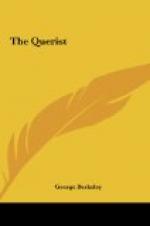104. Qu. Whether, when the imagination of a people is thoroughly wrought upon and heated by their own example, and the arts of designing men, this doth not produce a sort of enthusiasm which takes place of reason, and is the most dangerous distemper in a State?
105. Qu. Whether this epidemical madness should not be always before the eyes of a legislature, in the framing of a national bank?
106. Qu. Whether, therefore, it may not be fatal to engraft trade on a national bank, or to propose dividends on the stock thereof?
107. Qu. Whether it be possible for a national bank to subsist and maintain its credit under a French government?
108. Qu. Whether it may not be as useful a lesson to consider the bad management of some as the good management of others?
109. Qu. Whether the rapid and surprising success of the schemes of those who directed the French bank did not turn their brains?
110. Qu. Whether the best institutions may not be made subservient to bad ends?
111. Qu. Whether, as the aim of industry is power, and the aim of a bank is to circulate and secure this power to each individual, it doth not follow that absolute power in one hand is inconsistent with a lasting and a flourishing bank?
112. Qu. Whether our natural appetites, as well as powers, are not limited to their respective ends and uses? But whether artificial appetites may not be infinite?
113. Qu. Whether the simple getting of money, or passing it from hand to hand without industry, be an object worthy of a wise government?
114. Qu. Whether, if money be considered as an end, the appetite thereof be not infinite? But whether the ends of money itself be not bounded?
115. Qu. Whether the mistaking of the means for the end was not a fundamental error in the French councils?
116. Qu. Whether the total sum of all other powers, be it of enjoyment or action, which belong to man, or to all mankind together, is not in truth a very narrow and limited quantity? But whether fancy is not boundless?
117. Qu. Whether this capricious tyrant, which usurps the place of reason, doth not most cruelly torment and delude those poor men, the usurers, stockjobbers, and projectors, of content to themselves from heaping up riches, that is, from gathering counters, from multiplying figures, from enlarging denominations, without knowing what they would be at, and without having a proper regard to the use or end or nature of things?
118. Qu. Whether the ignis fatuus of fancy doth not kindle immoderate desires, and lead men into endless pursuits and wild labyrinths?
119. Qu. Whether counters be not referred to other things, which, so long as they keep pace and proportion with the counters, it must be owned the counters are useful; but whether beyond that to value or covet counters be not direct folly?




